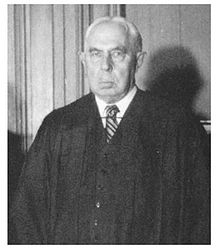|
Augustus Noble Hand
Augustus Noble Hand (July 26, 1869 – October 28, 1954) was a United States district judge of the United States District Court for the Southern District of New York and later was a United States Circuit Judge of the United States Court of Appeals for the Second Circuit. His most notable rulings restricted the reach of obscenity statutes in the areas of literature and contraceptives. He was the older first cousin of famed judge Learned Hand, who served on both courts with his cousin during most of Augustus Hand's tenure. Education and career Born in Elizabethtown, New York, Hand received an Artium Baccalaureus degree from Harvard University in 1890, and earned a law degree from Harvard Law School in 1894. He then established a private practice in New York City, which he maintained until 1914.[1] Federal judicial serviceHand was nominated by President Woodrow Wilson on September 28, 1914, to a seat on the United States District Court for the Southern District of New York vacated by Judge George Chandler Holt. He was confirmed by the United States Senate on September 30, 1914, and received his commission the same day. His service terminated on June 1, 1927, due to his elevation to the Second Circuit.[1] Hand received a recess appointment from President Calvin Coolidge on May 19, 1927, to a seat on the United States Court of Appeals for the Second Circuit vacated by Judge Charles Merrill Hough. He was nominated to the same position by President Coolidge on December 6, 1927. He was confirmed by the Senate on January 18, 1928, and received his commission the same day. He assumed senior status on June 30, 1953. His service terminated on October 28, 1954, due to his death in Middlebury, Vermont.[1] Notable decisionsContraceptivesOne of Hand's best-known decisions was rendered in the case of United States v. One Package, 86 F.2d 737 (2d Cir. 1934), in which he ruled that contraceptives, when imported by a licensed physician, were not immoral or obscene devices banned under the Comstock Law provisions incorporated into the Tariff Act of 1930. Hand wrote that "we are satisfied that this statute, as well as all the acts we have referred to, embraced only such articles as Congress would have denounced as immoral if it had understood all the conditions under which they were to be used. Its design, in our opinion, was not to prevent the importation, sale, or carriage by mail of things which might intelligently be employed by conscientious and competent physicians for the purpose of saving life or promoting the well being of their patients."[citation needed] Censorship The same year, Hand further limited the Tariff Act's restrictions in United States v. One Book Called Ulysses, 72 F.2d 705 (2d Cir. 1934), which ruled that the novel Ulysses, by James Joyce, was not obscene and therefore could not be banned from import into the United States. The opinion was significant in its urging that any test of obscenity could not rely on mere isolated passages but instead had to consider the work as a whole, a test the Supreme Court later endorsed.[2] These principles, filtered through a long line of later cases, ultimately influenced the United States Supreme Court's case law on obscenity standards.[2] Hand's opinion also displayed a historical perspective of the harm of overzealous censorship:
Hand's cousin, Judge Learned Hand, joined in Augustus Hand's opinion; Chief Judge Martin Manton dissented. Motion Picture AntitrustIn 1946, Hand was temporarily assigned to a three-judge panel of the New York Southern District Court for the U.S. government's antitrust case against the eight largest movie distributors. The court's per curiam decree in United States v. Paramount Pictures, 70 F.Supp. 53 (S.D.N.Y. 1946), significantly altered the motion picture industry in the United States, by forbidding the distributors from colluding with movie theaters in such anti-competitive licensing practices as price-fixing.[citation needed] Cases
See alsoReferences
Sources
|
||||||||||||||||||||||||||||||||||||||||||
Portal di Ensiklopedia Dunia
